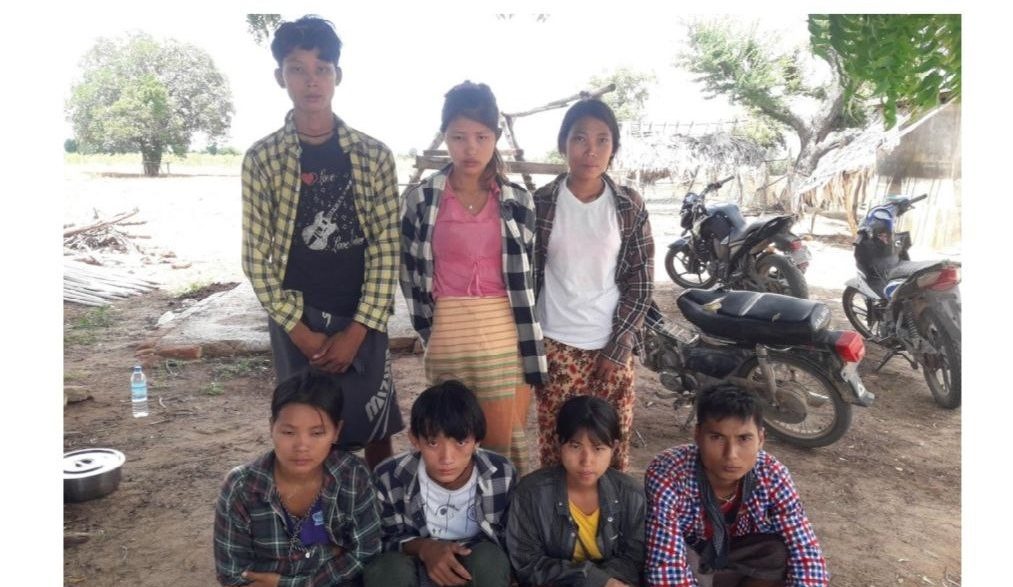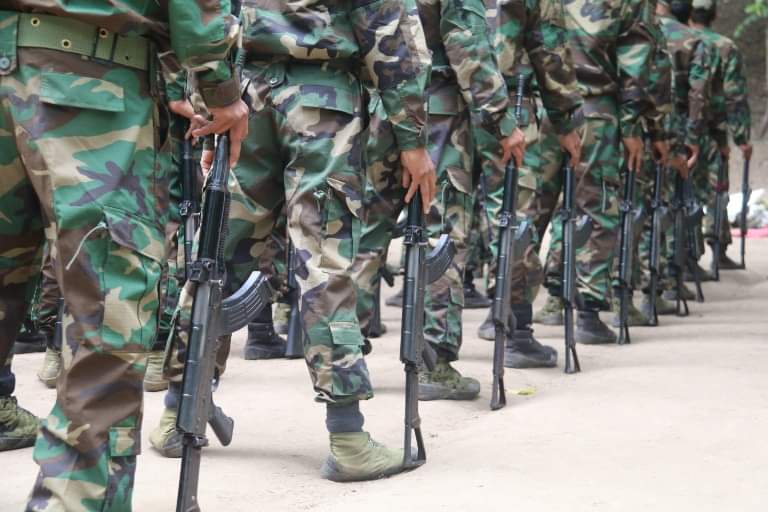Resistance groups tasked with protecting the public by Myanmar’s parallel National Unity Government (NUG) face criticism in two regions for abusing human rights.
Armed resistance against the regime erupted across the country following the junta’s violent crackdown on peaceful protests in March 2021. Since then, armed resistance groups known collectively as the People’s Defense Force have emerged.
Although the PDFs launched the armed revolution with homemade rifles, they have progressed to using war-grade weapons with support from the public at home and abroad. Currently, there are more than 300 PDF battalions and over 250 township-based groups, according to the NUG’s Defense Ministry.
Furthermore, there are around 400 guerrilla groups known as the local defense force (LDF), most of whom are in contact with the NUG. Besides the LDFs and PDFs, there are also people’s defense teams (PDTs, or Pa Ka Pha) under the NUG’s Defense Ministry.
For civil administration and public security, the NUG’s Ministry of Home Affairs and Immigration has formed the People’s Authority (Pa Ah Pha) and people’s security teams (Pa La Pha).
Driven by the strong commitment of citizens desperate to root out military dictatorship, the PDFs and LDFs quickly won wide public trust and respect.
However, criminal acts committed by resistance members in some areas have eroded that trust, according to resistance fighters and locals.
Notable crimes

Seven residents including teenage girls and boys in Chaung-U Township, Sagaing Region, were arrested by the head of Ngar Shan village people’s security team on suspicion of being junta informants on August 29 last year. All of the detainees – Myint Mo Aye, 15, Phyu Chit,17, San San Nge, 19, Zin Zin Maw, 20, Aung Ko San, 15, Thet Paing Oo, 16, and Kayin, 26 – were slaughtered by the group on August 30 without being interrogated, according to the Chaung- U Township PDF.
The three female victims were also reportedly raped before being killed by the group.
In April this year, a woman in Saw Township, Magwe Region was raped by eight members of a people’s security team after she was detained for alleged theft.
On July 21, two female residents of Saw Township aged 38 and 58 were lashed 30 times by a people’s defense team deputy and village head for laughing during a village meeting, according to local information group Yaw Alin Tan.
On August 3, an abbot in Magwe’s Gangaw district, Tilin Township was shot dead at his monastery by a resistance member from Gangaw battalion 15 and a civilian.
Reasons for the violence
Serious criminal acts committed by resistance groups have been attributed to conflicts between People’s Defense Forces, as well as abuse of the public in areas under their control. The source of the problem is the weak chain of command and code of conduct, according to Chaw Su San, a representative of Women Alliance Burma.
Chaw Su San is also a member of the Monywa People’s Strike Committee and Monywa University Student’s Union, who are currently advising People’s Defense Forces in Sagaing Region on politics, democracy, federal rule and a code of conduct. Numerous PDFs were formed over a short period without military regulations and so have little awareness of a code of conduct, she explained.
“They believe that they are revolting out of personal hatred for dictatorship, so they don’t need to follow any command. As an army, that kind of thinking is not appropriate,” Chaw Su San told The Irrawaddy.
Some PDFs seem like vigilantes who are free to violate human rights, she added.
A resistance chief in Sagaing’s Myaung Township said that some PDFs and LDFs had forgotten about the revolution and their commitments after they received weapons.
“We [all PDFs] have to focus only on the revolutionary way,” the resistance leader told the Irrawaddy.
Human rights abuse by resistance members is also fueled by a lack of legal consequences, according to revolutionary forces and locals.
Information group Yaw Alin Tan said the two women beaten in Saw Township have not received justice. If the NUG’s Defense Ministry fails to resolve this kind of oppression, worse violations will follow and people’s trust in the NUG will decline, it said.
“We see that these abuses are caused by the false assumption that having guns brings the right to do anything,” a Yaw Alin Tan spokesperson told The Irrawaddy.
Although the NUG has formed administrative, security, and judicial mechanisms, they often lack practical powers to investigate on the ground, Chaw Su San said.
“When they don’t have control over operations on the ground, there is a weakness in the judicial system,” she told The Irrawaddy.
‘Find out facts on the ground’
Revolutionary forces have urged the NUG to maintain close communication with resistance members on the ground to properly monitor developments.
“The NUG’s method and regulations are correct. The main requirement now is contact with people on the ground,” the Myaung Township resistance chief told The Irrawaddy.
Yaw Alin Tan’s spokesperson agreed, saying the NUG must start monitoring real conditions in the revolution.
“We can prevent these problems by trying to find out the facts on the ground,” he told the Irrawaddy.
The NUG’s Defense Ministry and activists are currently holding workshops and training on the code of conduct with People’s Defense Forces. If the NUG can provide knowledge and also take strong action, human rights abuses will be reduced, Chaw Su San said.
“But if the action is weak, the belief that crimes can be committed with impunity may lead to more human rights violations.”
‘Eliminate the culprits’
U Yee Mon, the NUG’s Defense Minister, said PDFs must get rid of the idea that they stand above the people.
“The guns we hold were provided by the people. The rice we eat was provided by the people. There is no worse behavior than abusing and bullying the people with arms. If PDF members behave like this, they must be clearly identified and eliminated,” U Yee Mon told new PDF graduates at a ceremony on Aug. 9.
The armed resistance has been issued with a code of conduct and instructions on behavior on the battlefield and in civilian life. Resistance members must also obey the chain of command, said U Maung Maung Swe, second secretary of the NUG’s Defense Ministry.

But he added that with so many different resistance forces operating, there are investigative weaknesses as well as cases that lead to public misunderstanding.
“In these early days of the administrative mechanism, there may be gaps. We still see crimes based on individuals’ [lack of] morality and emotions,” U Maung Maung Swe said of the reason behind abuses committed by resistance fighters.
The NUG formed the Complaint Resolution Committee in May this year to identify and investigate violence and possible war crimes committed by the resistance.
So far, 146 complaints have been filed with the committee, mostly by the public. They concern conflicts between armed groups, red tape in the administration, disputes among resistance armed forces and the various security and administrative groups, and crimes against humanity committed by pro-junta Pyu Saw Htee militia disguised as PDFs, according to the Defense Ministry.
Of the complaints, 10 have been resolved, 12 recorded, and 17 transferred to other ministries that hold jurisdiction.
U Maung Maung Swe acknowledged that some crimes were difficult to investigate due to conditions on the ground, but specific action is being taken where investigation is possible. He confirmed that the crimes committed in Chaung-U and Saw townships were being investigated by the Ministry of Home Affairs and Immigration.
He added that NUG will log cases that are difficult to investigate under current conditions and reopen them following the revolutionary period.
“We will take responsibility for every person who suffers and bring them justice. However, I want to be clear that those who collaborate in the junta’s war crimes will not have the same rights as the people,” U Maung Maung Swe told The Irrawaddy.
The Burmese Women’s Union said it condemned the violence against women and children by any armed group, including the junta.
Naw Khin San Htwe, general secretary of the Burmese Women’s Union, said: “We are seeking to have the [junta’s] military prosecuted in an international court for war crimes of sexual violence, and people’s security forces also need to take action to prevent such violations from happening again.”
Your Thoughts …
This post was originally published on this site be sure to check out more of their content.








